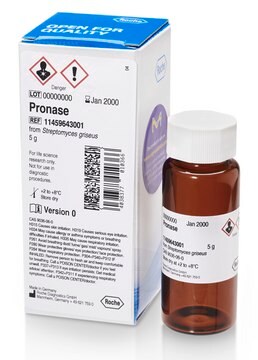A7554
Monoclonal Anti-Bovine IgG−Alkaline Phosphatase antibody produced in mouse
clone BG-18, purified immunoglobulin, buffered aqueous glycerol solution
Synonym(s):
Monoclonal Anti-Bovine IgG
About This Item
Recommended Products
biological source
mouse
Quality Level
conjugate
alkaline phosphatase conjugate
antibody form
purified immunoglobulin
antibody product type
secondary antibodies
clone
BG-18, monoclonal
form
buffered aqueous glycerol solution
species reactivity
bovine (non-reactive to IgM)
should not react with
pig, human, rabbit, sheep, cat, guinea pig, canine, horse, goat
technique(s)
direct ELISA: 1:25,000
dot blot: suitable
immunohistochemistry (formalin-fixed, paraffin-embedded sections): 1:75 using using rabbit spleen sections and bovine anti-rabbit IgG
western blot (chemiluminescent): 1:100,000
isotype
IgG1
shipped in
wet ice
storage temp.
2-8°C
target post-translational modification
unmodified
Looking for similar products? Visit Product Comparison Guide
Related Categories
General description
Specificity
Immunogen
Application
- western blotting
- enzyme linked immunosorbent assay (ELISA)
- dot blot
- immunohistochemistry
Biochem/physiol Actions
Physical form
Disclaimer
Not finding the right product?
Try our Product Selector Tool.
Storage Class Code
10 - Combustible liquids
WGK
WGK 3
Flash Point(F)
Not applicable
Flash Point(C)
Not applicable
Personal Protective Equipment
Certificates of Analysis (COA)
Search for Certificates of Analysis (COA) by entering the products Lot/Batch Number. Lot and Batch Numbers can be found on a product’s label following the words ‘Lot’ or ‘Batch’.
Already Own This Product?
Find documentation for the products that you have recently purchased in the Document Library.
Customers Also Viewed
Our team of scientists has experience in all areas of research including Life Science, Material Science, Chemical Synthesis, Chromatography, Analytical and many others.
Contact Technical Service
